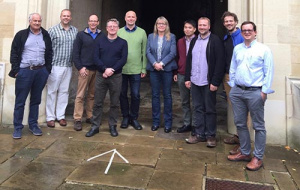Climate workshop
 Professor Philip Stier, Supernumerary Fellow in Physics, hosted a workshop at Univ with some of the world’s leading climate scientists in November 2019. The workshop was organised under the GEWEX Aerosol Precipitation (GAP) initiative that Professor Stier co-chairs with Sue van den Heever (CSU).
Professor Philip Stier, Supernumerary Fellow in Physics, hosted a workshop at Univ with some of the world’s leading climate scientists in November 2019. The workshop was organised under the GEWEX Aerosol Precipitation (GAP) initiative that Professor Stier co-chairs with Sue van den Heever (CSU).
The aim of the workshop was to critically review the existence and strength of satellite-based constraints for aerosol (air pollution particles) effects on precipitation. This meeting brought together some of the world’s leading climate experts working in this area for a workshop at Univ and they are now working on a review article summarising their findings.
Aerosols have been hypothesized to have a wide range of effects on precipitation, which we recently reviewed and categorised in a broad expert workshop. In the workshop, the climate scientists assessed the strength of observational constraints for the main effects. Professor Stier established the Climate Processes Group in the Department of Physics, which combines work on global climate models, earth observations from satellites and surface and aircraft based in-situ measurements as well as detailed process models with theory to improve our understanding of the climate system.
Professor Stier co-teaches the 4th year undergraduate lecture “C5 Physics of Atmospheres and Oceans” in the Department of Physics. He also led the curriculum development for the Physical Climate Stream of the Oxford Doctoral Training Partnership (DTP) in Environmental Research and have been overseeing its implementation. For the Doctoral Training Partnership, he teaches three courses: Introduction to the Physical Climate System, advanced training course in Atmospheric Physics, graduate research seminars for the Physical Climate Stream.
Published: 23 January 2020
Explore Univ on social media
